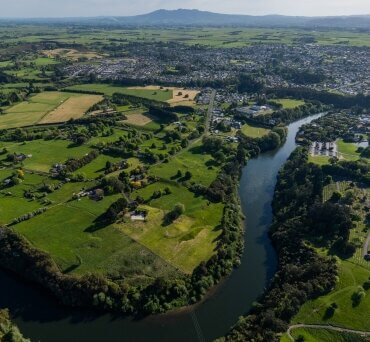
Waikato River
The Environment Court proceedings for Plan Change One (PC1) have concluded, and we are now awaiting a decision which is due in the middle of this year.
The new Government has signalled they intend to make changes to national rules around freshwater regulations on farm in an effort to make things more pragmatic for farmers, however we as a council are yet to understand the details of what this will look like.

Stu Kneebone
The regional council is continuing our mahi to support the region’s farmers to improve freshwater management, particularly with regard to the adoption of Fresh Water Farm Plans (Fwfp), noting that these will be required under PC1 as well as via national regulations. Regardless of any changes in central government regulations, the regional council supports the implementation of farm plans as a really good way to enable the uniqueness of individual farms and their systems throughout the region to continue while demonstrating good management of the environment.
To refresh, farmers in the Waipa Freshwater Management Unit (FMU) or Waipa catchment need to submit a Fwfp for certification by February 2025. For those in the middle/upper Waikato FMU, the final date is July 2025. These dates are part of the phased rollout of Fresh Water Farm Plans (Fw-fp) in both the Waikato and Southland regions, and cover all farmers with 20ha or over in arable or pastoral use, 5ha in horticultural use or 20ha of combined use.

The Waikato River. Image: Thajsko licensed under Creative Commons
One of the obligations that councils have is to develop what is known as a Cccv (Catchment Context, Challenges and Values) for each FMU. A Cccv is a collection of all the relevant information about the catchment you farm in, including the catchments unique features such as soils, climate, water quality, areas of cultural significance and so on. This then enables a farmer to understand the issues and challenges in their catchment and use this information to design their Fwfp to manage or reduce the impacts of their farming operation on the health and wellbeing of the catchment. All of this information is available on the regional council website.
A lot of work is also happening to ensure as best as possible that there is consistency across regional councils with this stuff. Te Uru Kahika (representing regional councils) is working with the Ministry for Primary Industries and the Ministry for the Environment to develop a Fwfp template for farmers to use. Our council farm engagement team continue to engage and work with industry stakeholders to ensure constant messaging, consistency where possible, and be as supportive as we can to help the sector with this process. This includes working with farmers that already have farm plans to enable these to meet new regulatory requirements.
Another focus has been on the training of developers and certifiers of Fwfps. We continue to see a good level of interest from those wanting to undertake this role and work with farmers to help them develop their plans. To date, we have 38 people undertaking regional specific training, and have held 4 on farm training days for certifiers and developers. Five more training days are scheduled through to April.
Regardless of what happens with government regulations, our focus continues to be on doing stuff that helps and supports farmers in the region to manage their farm system to deliver really good environmental best practice.








